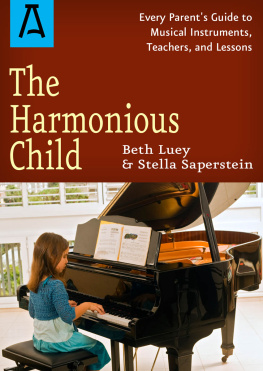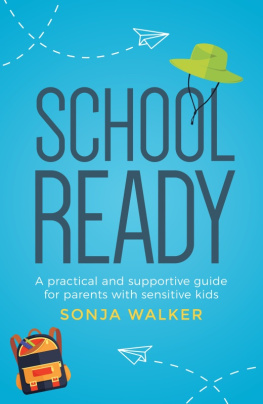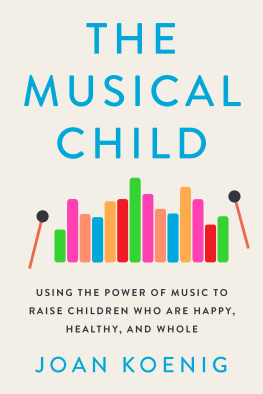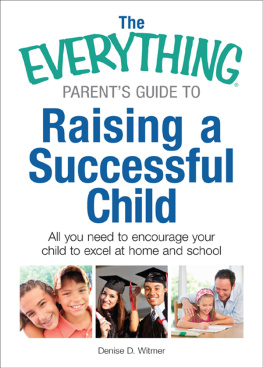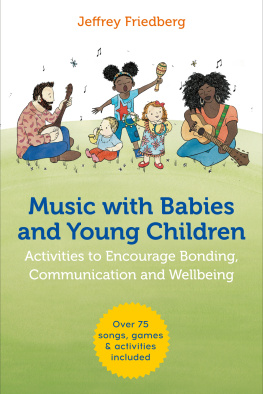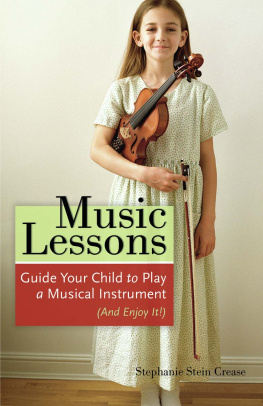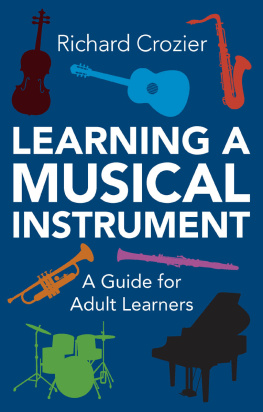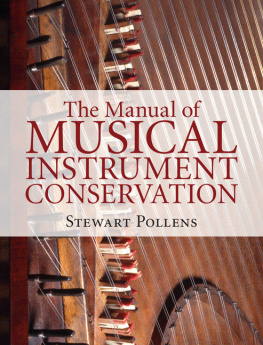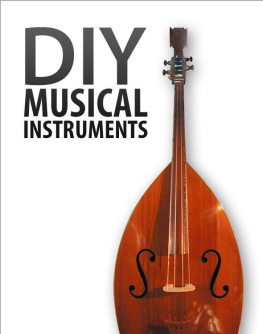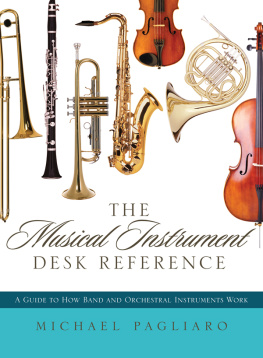Contents
All rights reserved, including without limitation the right to reproduce this ebook or any portion thereof in any form or by any means, whether electronic or mechanical, now known or hereinafter invented, without the express written permission of the publisher.
First Edition published 2003 by Celestial Arts.
Copyright 2003, 2013 by Beth Luey & Stella Saperstein
ISBN: 978-1-5040-2974-2
Distributed in 2016 by Open Road Distribution
180 Maiden Lane
New York, NY 10038
www.openroadmedia.com

The Harmonious Child
Every Parents Guide to Musical Instruments, Teachers, and Lessons
BETH LUEY & STELLA SAPERSTEIN
To the memory of my father
BETH
To my parents, for their love and their songs
To my daughter, for making me a better teacher
To my husband, for believing in me
To all my past and present students and their parents,
for everything I learned from them
STELLA
To all parents and children who want to bring the harmony of music into their lives
BETH & STELLA
Acknowledgments
We would like to thank the people who encouraged us and who read and commented on our manuscript: Dean Elder, Peggy Luey, Debbra Wood Schwartz, Maria Sheiner, Irene Tseng, and Ann Wolf.
Preface
I grew up in a house where music was very important, though no one in the family was a professional musician. My father had wanted to be a pianist and, growing up in New York City, took lessons from a teacher with a studio in Carnegie Hall. As a teenager, he realized he would not succeed as a concert pianist and instead became a scientist. He continued to play for fun and also became an amateur conductormost notably of a symphonic band composed of scientists at Brookhaven National Laboratory.
My father was my first piano teacher, and our lessons were not a success. I was too nervous and afraid of disappointing him, and I never actually learned to read music. When I was ten we moved to Pittsburgh, where I studied with two very good teachers (and finally learned to read music). My father and I played four-hand piano piecesa spectacle that bore an eerie resemblance to one of Victor Borges comic routines. I also attended a lot of concerts, mostly with my father. Several members of the Pittsburgh Symphony were close family friends, and music and talk of music were a constant presence.
I was not the worlds best piano student. I didnt always practice, and to this day I occasionally dream that I have a piano lesson the next day and havent opened my music. I got terribly nervous before recitals and was very relieved that my second teacher held only individual recitals for students who wanted to have them. But I enjoyed playing and never considered ending lessons. In part, this was because all of my friends also took piano lessons, and fooling around at the piano was built into our after-school social life. When I went off to college I stopped taking lessons, but I still played for fun. My best friend was a talented flutist, and hanging out with musicians was an enjoyable part of college life.
My husband had studied piano throughout high school as well, and soon after we bought a large enough house, we bought a baby grand. When our daughter Nora was born, I assumed she would study the piano, though she picked up on the idea independently and a bit earlier than I expected.
Noras lessons have taught me a lot about both music and parenting. Stepping back and letting her take responsibility for practicing was an important part of letting her grow up in other ways. I loved seeing her develop from the timid little girl whose playing was barely audible (Stella described it as norissimo) to the teenager who rejected recital pieces as insufficiently flashy. I refused to let her end her lessons when she was eleven. I told her she would not be old enough to make such an important decision until she was fifteen, and by then she had no intention of quitting.
I cannot imagine living without music to listen to, and I cannot imagine raising a child without music any more than I can imagine raising a child without books and good manners.
BETH LUEY
In 1979 I emigrated from what was then the Soviet Union to the United States and joined an international group of American musicians and music educators. Although it was frustrating at times, the experience was an interesting transition. Compared with a very rigid, disciplined, strictly regulated, and controlled Soviet system, the American music education system at the elementary levelmostly private, unregulated, and undisciplinedseemed to make no sense. At the same time, music education in U.S. colleges and conservatories is excellent, and schools of music such as the Curtis Institute, Eastman (the University of Rochester), Juilliard, and Manhattan produce world-class musicians. I asked myself, What and how can I teach and expect to achieve any results in one half-hour lesson a week? And what about separate lessons for music theory, solfge, the history of music, ensemble, accompaniment, or piano as a second instrument?
I felt very frustrated in the beginning and, like many of my colleagues from the USSR, I considered changing my profession. But that did not happen. What did happen, however, was that I evolved from being a strict and rigid graduate of a world-famous music conservatory into a more tolerant, patient, and flexible music educator. During the thirty years I have been teaching piano (ten in the USSR and more than twenty in the United States), I have taught hundreds of students ranging from the musically challenged to average to the very gifted. Never lowering my standards, I offered all of them the same level of my expertise and dedication.
What they learned depended on their ability, interest, and need. But I learned a lot. I saw the result of our work as I listened to them play at our class recitals. For some, it was a huge personal victory just to get up on stage and play in front of the audiencea victory over nerves. For others, it was a moment of glory, a time to share their talent, an opportunity to shine. A few times I caught myself thinking, Hey, this really is not bad for one half-hour lesson a week and minimal practice. And dont forget: These students are not all selected for their musical gifts. They are anybody who wants to learn and who loves music.
Am I promoting mediocrity? I dont think so. I want everyone to have an opportunity to have music in their lives, and I dont want empty concert halls. As Eleanor Roosevelt recognized, For a really healthy development of all the arts, you need an educated audience as well as performers. I learned not to compare my students with each other, letting them develop individually, at their own pace. None of this would have been possible in the Soviet Unions music system. Most of my students simply would not be accepted into the Russian elementary music school because they are of average musical ability, rather than extremely gifted.
I also learned a lot from my students parents, especially the patient ones. At first I was in awe of their patience, those who didnt care if their children played the same piece of music for months (when even I was ready to give up). Later I started admiring their endurance. Now I use them as examples for those parents just beginning the journey with their children into the world of music. Be patient but realistic, encouraging but honest, and you will be rewarded with the sounds of music your children make.
Anyone can be taught music, but whether they become concert artists depends on many factors. Students who are not musically gifted, who are just plodding along, will never become great musicians, but they can become an appreciative audience and develop other important qualitiesdetermination, self-discipline, and focus. Do we teach math only to the mathematically gifted? Or English only to future writers? Give every child a chance. Introduce music into their lives, sing and dance with them, encourage them, take them to concerts, and one day you will realize that your life too has been enriched by music, and that you have something very special to share with your children.

